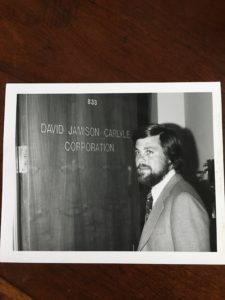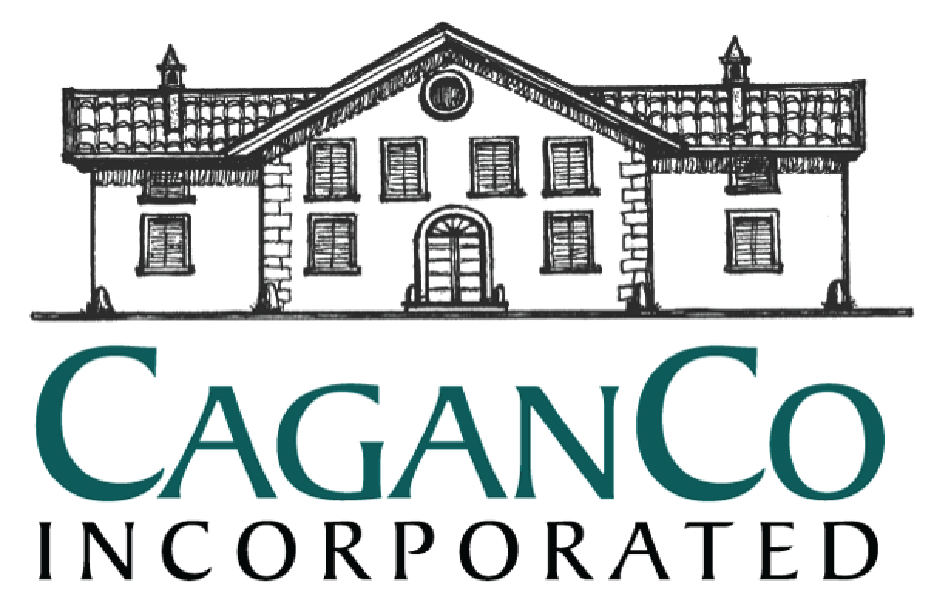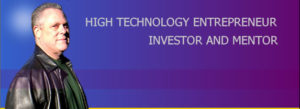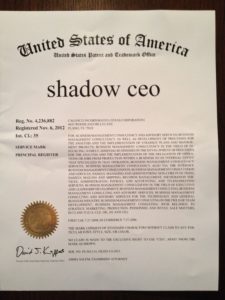Recognition & History
Recognition and History
Over his five plus decades in the business world Dennis has achieved some degree of public notoriety. He has been widely quoted in the trade press and general business press, including The Wall Street Journal, Fortune and Forbes magazines. He has written numerous articles for publications including Directors & Boards, NACD Directorship, Family Business, Private Company Director, CRN-Computer Reseller News, Electronic News, California Business, Electronic Business, AFSMI Professional Journal, AFSMI European Services Industry, Service & Support Management/MSM magazine, Service Management magazine – UK & Europe, and CTIA Computing Channels/A Better Channel magazine.
His career has included many speeches at computer industry trade shows and conferences sponsored by companies and including the Interface Group (including COMDEX), Microsoft, U.S. Association for Small Business and Entrepreneurship, Dataquest, Frost & Sullivan, InfoCorp, the Yankee Group, BIS/CAP (NYNEX), ISNI, Association For Services Management International (AFSMI), YPO Young Presidents Organization, WPO World Presidents Organization, YEO Young Entrepreneurs Organization, International Hotel/Motel & Restaurant Show, Restaurant and Hotel International Design Expo and Conference, National Association of Home Builders, Multi-Housing World, American Resort and Residential Development Association, Club Industry, Club Managers Association of America, Crittenden Golf Real Estate Development conferences, Crittenden Hotel Development Conference (as Chairman), National Association of Senior Living Industries, and South Eastern Builders Conference. In 2013 Mr. Cagan was a keynote speaker at the inaugural Private Company Governance Summit, held in Washington, D.C. and sponsored by Directors & Boards Magazine, Family Business Magazine, and Deloitte. He spoke at this same event again in 2014, 2015, 2016, and 2019.
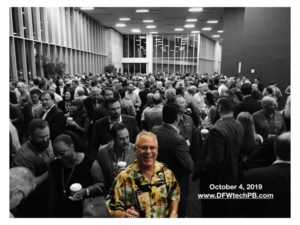 A Deeper Dive
A Deeper Dive
Since 1967 Dennis has held various high technology industry positions in sales and marketing, operations, executive management, company leadership and interim executive positions with manufacturing, distribution and services-based companies. He has founded or co-founded eighteen companies and sat on 67 corporate fiduciary boards of directors, and many not-for-profits.
Dennis is a nationally recognized authority on private company governance and information technology, including the Internet, software, hardware, services, and communications, in the disciplines of company strategy, sales, marketing, product development, and distribution channels. He has authored a multitude of articles and has spoken widely at industry conferences, to entrepreneurial organizations, and to paying corporate audiences such as Microsoft.
1967
Dennis’s technology career started in 1967 as a computer operator with IBM – actually operating a large multi-million dollar System 360 computer installation, occupying about 5,000 square feet. He has been know to joke that this was his first personal computer because he was on the graveyard shift – therefore from midnight to 8:00 AM, he was the only operator.
1968
A year later he joined Call-A-Computer, a newly formed computer timesharing company, as a salesman. Later that year Dennis and two engineer friends founded GBC Associates to write computer software programs for clients wishing to do remote application computing on the timesharing computers.
1969
From there he moved on to IPOL – Information Processing On-Line, a small systems integrator (now called VAR’s), as Director of Marketing. That company evolved into a representative for a variety of computer peripheral products.
1970
Soon after, Dennis went to work directly for one of the vendors, Delta Data Systems, a small manufacturer of video display terminals headquartered in Pennsylvania, as their Western Regional Sales Manager.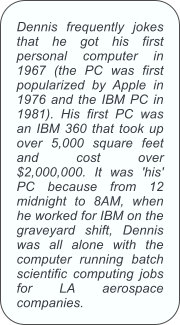
1971
In 1971 Dennis was hired as the Western Regional Sales Manager (and the first salesman) for the video display terminal division of Lear Siegler, Inc., a Fortune 500 company. At LSI he personally conceived of, and fully implemented, what many consider to be the computer industry’s first distribution program (as a company’s primary sales channel). Prior to this, all types of computer products were either sold by direct sales forces (like IBM) or through manufacturer’s reps with territorial exclusivity – there were no resellers.
1975
In 1975 Dennis left LSI, along with four engineers, and became a co-founder and Vice President of Sales and Marketing for SOROC Technology, Inc., a start-up video display terminal manufacturer.
1976
In 1976 he sold his interest in SOROC in order to found his own company – one of the earliest computer product distribution companies – The David Jamison Carlyle Corporation (DJC). The name was a fictitious name made up from Dennis’ initials – DJC.
1979
Dennis Cagan Keynoted the first COMDEX Show, in Las Vegas.
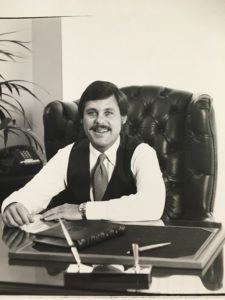 1980
1980
In 1980 The David Jamison Carlyle Corp. was listed #32 on the inaugural publication of the Inc. Magazine Inc. 100 Fastest Growing Private Companies.
1981
In 1981, with annual revenues of $22M DJC went public through a reverse merger and became listed on NASDAQ as DJCC. The firm was the period’s leading national reseller of computer peripherals and data communications equipment.
1982
DJC’s 1982 revenues reached $50 million. At various times DJC was recognized as a member of the Inc. Magazine “Inc. 100” (the magazines very first such published listing); the California Business Magazine “Fastest Growing 100”, the Venture Magazine “Fast-Track 100”, and The Executive Magazine “50 Fastest Growing Companies in Los Angeles.” In 1983 a large public British firm acquired DJC. Within a year Dennis moved on.
1982
In 1982 Dennis incorporated his consulting practice Caganco Incorporated, a California C corporation. During this period he was often on retainer with several clients at one time. His consulting has always been somewhat unusual and “hands-on”, working closely with his clients. Frequently he was already a board member of a company when he stepped into an interim C-level management role. Information Technology companies both large (over $60 billion) and small have benefited from Dennis’s knowledgeable advice. Jointly with the client, he analyzes the firm’s position including company infrastructure, competitive environment, products, existing and potential sales and distribution channels, personnel, etc. Next, all the specific issues are addressed with the development of appropriate procedures, techniques, programs, systems or strategies. Dennis has truly evolved a number of unique methods for both developing and implementing these solutions. More often than not Dennis was either on or soon joined the board of directors.
1983
In mid-1983 Dennis was retained in a Shadow CEO engagement to work side-by-side with CEO of AT&T’s Computer Systems Division. CSD was the $2B revenue division of AT&T that manufactured computers used by all seven Bell Operating Companies (BOCs) within major central office applications. Dennis worked with the CEO as he prepared for CSD to be spun out of AT&T along with the BOCs in January 1984. At that time the company, known as AT&T Technologies, became an independent company. Until 1985 Dennis continued to advise on most of the sales and marketing aspects of AT&T’s initially successful entry into the general-purpose computer business – which was one of the primary objectives of the divesture of the seven Bell operating companies on 1/1/1984. Dennis served as the key consultant on the initial strategies and implementation of AT&T Technologies’ efforts. He was the primary architect of both the overall strategy and the specific elements of AT&T’s Value Added Reseller program. After that, he did the same for their Value Added Systems Distributor program. Both were somewhat unique within the computer industry at that time, and both were judged very successful. This assignment was the origin of Dennis’s Shadow CEO designation.
1985
Subsequently, at AT&T’s request, Dennis founded another computer distribution company to specialize in AT&T computer products. This firm was awarded the first and exclusive Master Value Added Systems Distribution contract by AT&T. Dennis quickly sold the new company to Ducommun Incorporated (parent company of Kierulff Electronics). Ducommun also retained Dennis as a consultant to recruit a complete management team and launch operations. In the first year of the new company – Ducommun Data Systems (DDS), it was profitable on $22M of revenue, and second-year revenues exceeded $30 million. Arrow Electronics later acquired DDS.
1987
In 1978 Dennis had become the major stockholder and a Director of Design 1 Interiors – a well-known LA-based commercial interior design firm. In 1987, on a part-time basis, Dennis became Senior Vice President and a Principal of the firm. Design 1 went on to become one of the world’s 25 largest full-service commercial hospitality interior design firms. Eventually ranked in the top 10 on the Interior Design Magazine Top 100 Hotel and Restaurant Giants Worldwide. The firm had divisions specializing in hospitality, senior housing and model home merchandising. Design 1 was responsible for the interiors of dozens of hotels, including several Five-Star, throughout the world. The firm’s clients included Walt Disney, Donald Trump, Steve Wynn, Marriott and many more. Dennis was actively involved in the firm’s marketing and business development activities. He went on to become a well-known speaker on commercial interior design and merchandising at industry conventions including International Hotel/Motel & Restaurant Show, Restaurant and Hotel International Design Expo and Conference, National Association of Home Builders, Multi-Housing World, American Resort and Residential Development Association, Club Industry, Club Managers Association of America, Crittenden Golf Real Estate Development conferences, Crittenden Hotel Development Conference (as Chairman), National Association of Senior Living Industries, South Eastern Builders Conference, and others.
1990
In 1984 Dennis had helped fund and mentor some of his ex-DJCC employees in two start-ups – Data Enterprise, a service firm, and Century Computer Brokers, a used computer equipment distribution firm. Soon after the boards of both companies, which included Dennis, merged them together to form Century Computer Marketing (CCM). Dennis subsequently was asked to join the management team and position it for sale by working to substantially increase the enterprises’ value. In his capacity as Senior VP of Sales and Marketing, Dennis built CCM into the global industry leader in multi-vendor personal computer service parts support. Century was one of the world’s largest independent distributors of microcomputer service parts to the computer maintenance industry (termed a fourth-party support company). During his tenure, between 1991 and 1994, Century’s annual revenues grew from $21 million to almost $50 million. In March 1994 Aurora Electronics, Inc. (ASE: AUR) acquired Century for $38 million, almost all cash. The combination of Century and Aurora created one of the computer service industry’s largest fourth-party support companies. Dennis served as Vice President of Corporate Marketing and Business Development for Aurora Electronics, Inc. (and Senior Vice President of Marketing for their Century Computer Marketing division). Aurora subsequently merged with the Cerplex Group (OTC/BB: CPLX).
1993
In September 1993 Dennis was named to the first annual “The Service 25” 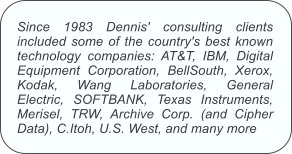 (top executives in the computer service industry) by Service News Magazine.
(top executives in the computer service industry) by Service News Magazine.
1995
StarPress, Inc. (Great Bear Technologies-NASD EBB): Dennis served as acting Chief Operating Officer/Executive Vice President. StarPress, Inc. was a highly regarded multimedia software publisher, where Dennis had been a member of the board of directors for five years. Dennis was asked to work with StarPress management as their predecessor company (Great Bear Technologies) completed the acquisition and integration of StarPress. The company then quickly entered into another merger with Graphix Zone (NASDAQ: GZON). Dennis oversaw all sales, marketing, and operations activities.
1996
Software.com, Inc.: The company received $5M in non-dilutive capital. Dennis was already a member of the Board of Directors and was asked to join the company full-time for a one-year period. In 1996 he became Senior Vice President of Sales and Marketing. Software.com (NASDAQ: SWCM), known as ‘The Internet Infrastructure Company,’ was one of the most highly regarded of the Internet-related startups – being ranked in Top 10 lists from Upside Magazine, Convergence Magazine, and others. From January to May 1996 Dennis was responsible for all sales and marketing activities. After the acquisition of Accordance, he continued as head of worldwide sales. Activities included the company’s complete sales channel strategy encompassing large Internet Service Providers, hardware and software OEMs, a formal VAR/reseller program and an active direct effort including both telemarketing and the World Wide Web. In 1997 Dennis retired his sales position but remained on the Board. The firm went public in 1999. Between 1995 and 1999 the firm’s market capitalization grew from $12M to $6B. The company subsequently was merged with Phone.com to create Openwave (NASDAQ). If you are using AT&T, Verizon or Sprint for your email, it is being delivered by the original Software.com software.
1997
Intervista, Inc.: Intervista Software, Inc. was perhaps the best-known company in Internet standards-based interactive 3D software technology. The firm’s founder was the co-inventor of VRML – Virtual Reality Modeling Language. As a Board member, Dennis took over for four months as Executive Vice President with responsibility for corporate strategy, sales and marketing.
1999
SOFTBANK: In late 1998 Dennis joined the board of First Virtual Holdings – an early Internet IPO. Dennis was brought in by SOFTBANK, the controlling investor of this public company, to serve as interim CEO and reposition the company as MessageMedia, Inc. (NASDAQ: MESG). During his four-month CEO tenure, from January to April, he moved the company from San Diego, CA to Boulder, CO. He realigned the management team, integrated two previously-started acquisitions, initiated two new acquisitions, and moved the company’s public market capitalization from $125 million to over $1 billion. During that time the company he completed a $10 million private placement, closed the largest email transaction in history to date – to send 1B emails, and recruited and installed a permanent CEO to replace himself. MessageMedia, which was acquired by DoubleClick in January 2002, was a leader in providing services based on Internet e-mail for use by corporate customers for the purpose of one-to-one customer relationship management and direct marketing.
2000-2004
In 2000 Dennis founded the Santa Barbara Technology Incubator, LLC and Santa Barbara Technology Group, LLC (SBTG). By 2002 it had invested in and incubated 40 start-up tech companies. Until 2019 SBTG was in business monitoring its remaining portfolio companies. When it was in an operational mode SBTG was a private investment and consulting firm that was originally engaged primarily in working with and investing in early-stage technology companies. in those years the firm served as an important connection for any high-tech start-up on the California Central Coast. They provided world-class management assistance, strategic guidance, and valuable connections for entrepreneurs. They also provided young companies access to financing and operational and technological infrastructure. The company’s portfolio had some small exits and one for $380M and another for $600M.
SBTG was the founder of SB Tech Ventures, which was one of the country’s first tech-oriented co-working spaces. It operated the ‘Incubator’ offering flexible, full-service office space for companies in downtown Santa Barbara. The ‘Incubator,’ consisted of 26,000 square feet of full-service office space available for lease to companies in Santa Barbara. In addition to state-of-the-art services and infrastructure, the facility provides the flexibility that young, growing companies need: flexible office layout systems, and flexible growth options. The Incubator gained the reputation as the most technology-friendly executive office environment on the Central Coast.
SBTG was also the founder and host of the well-known Santa Barbara Tech Brew a popular networking event for high-technology professionals. SB TechBrew is one of the best-attended and longest-running technology networking events in the country. Roughly six times each year, from 2000 to the present the SB Tech Brew has provided thousands of technology professionals with a venue to exchange ideas, network, and focus on high-tech business growth in Santa Barbara. Invitations to the event are open to anyone interested in high technology who wants to actively participate in the future of the local business community.
2006
From May 2006 to May 2008 Dennis relocated from Santa Barbara to Dallas and served as the Chairman, Chief Executive Officer and President of TWL Corporation (TWLP.OB) and its subsidiary TWL Knowledge Group, Inc., both based in Carrollton, Texas. TWL is a leading provider of integrated learning solutions for compliance, safety, emergency preparedness, continuing education and skill development in the workplace. Since 1986, TWL Knowledge Group has met the training and education needs of more than eight million professionals in the industrial, healthcare, fire and emergency, government, law enforcement and private security markets. The company produces and delivers education and workplace skills training content to organizations via global satellite television, the Internet and traditional media such as DVD, CD-ROM and PC-based, quasi virtual reality simulation platform.
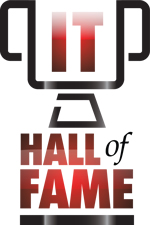
2011
Dennis Cagan was inducted into the IT Hall of Fame – Channel Section (administered by CompTIA). He was honored for being the Treasurer, and on the founding team of the CompTIA A+ Certification Program, one of the most successful trade licensing programs in the computer industry. To date, A+ has certified millions of personal computer technicians globally. The program is said to generate over $50M in annual royalties to CompTIA.
2013
Dennis Cagan was honored by the National Association of Corporate Directors (NACD) and the Dallas Business Journal as one of the inaugural class of 12 Outstanding Directors in North Texas.
1983-Present
Since 1983 Dennis has consulted in Shadow CEO roles, sat on boards of directors, and taken on periodic interim CEO positions. Dennis continues to provide clients with management consulting and mentoring through Caganco Incorporated, in the form of his four signature roles: Shadow CEO®, Board Practice (formation and management of corporate boards of directors), Governance Forensics practice, and interim CEO situations. Since 1983 Caganco has helped at least 100 CEOs. Clients have ranged from $2B enterprises down to ‘back-of-the-napkin’ start-ups.
Dennis teaches a course titled Governance and Boards of Directors 101 as an Instructor at the Cox School of Business at Southern Methodist University (SMU). He has received three consecutive annual Teaching Excellence Awards.
